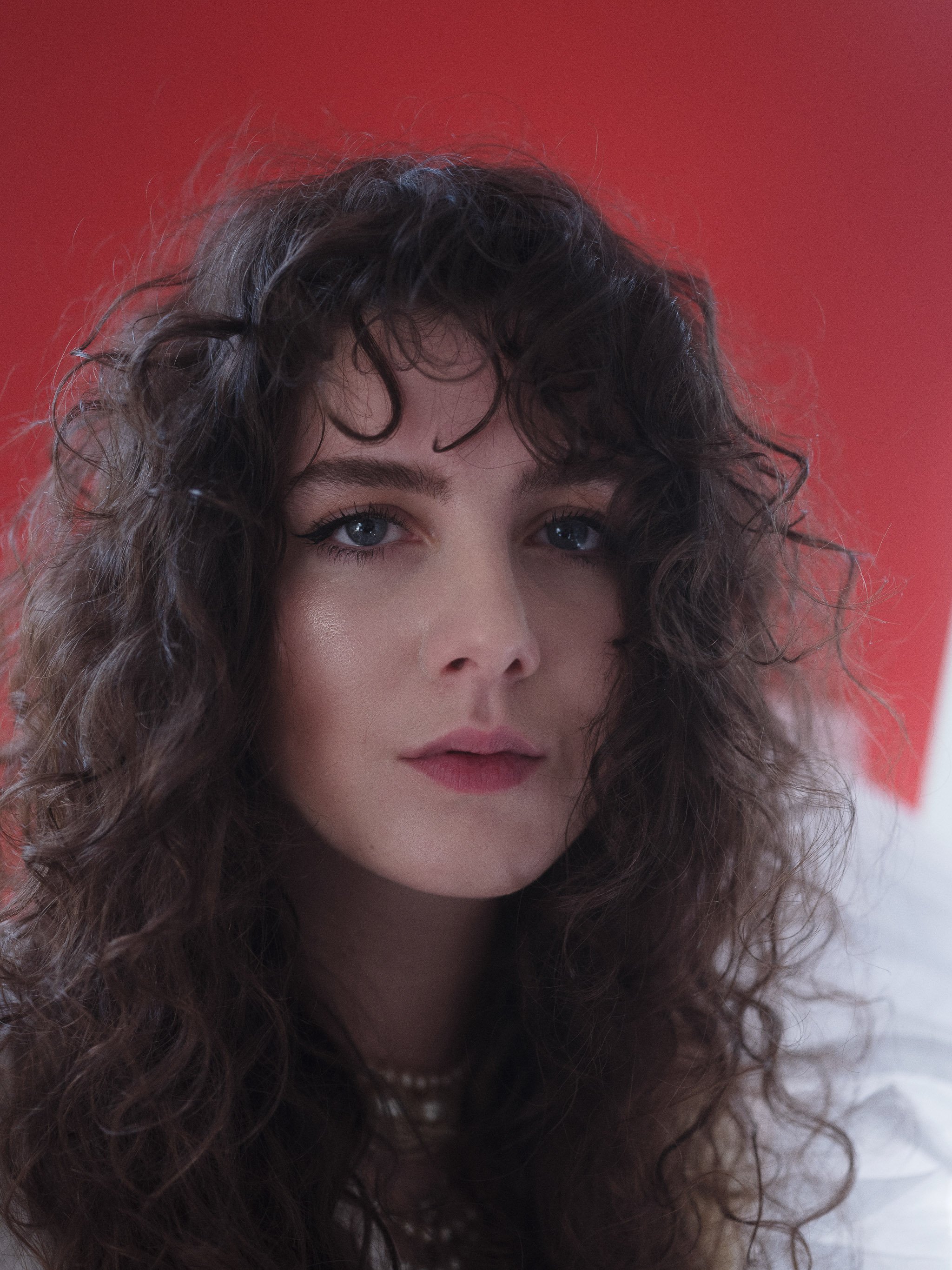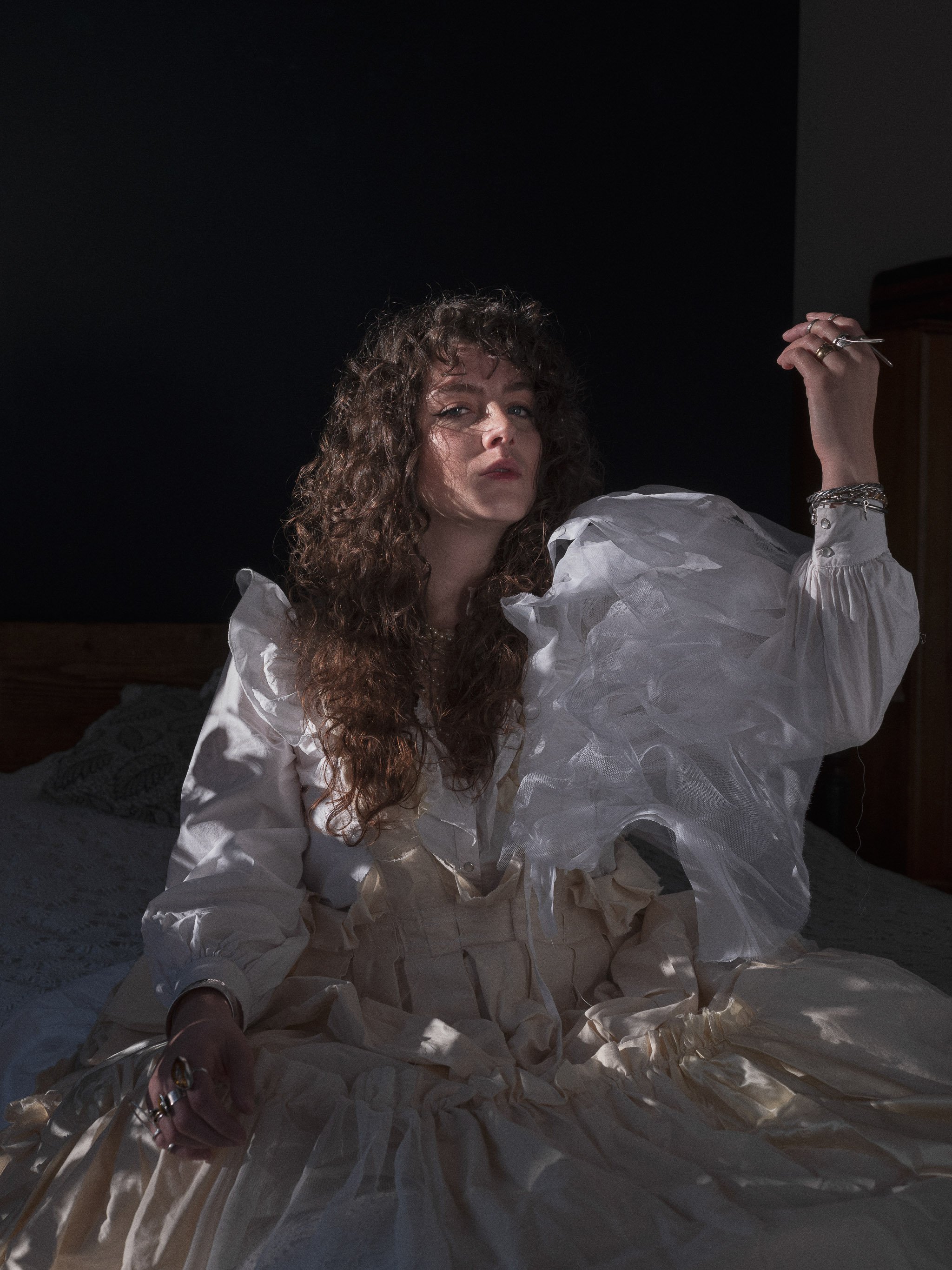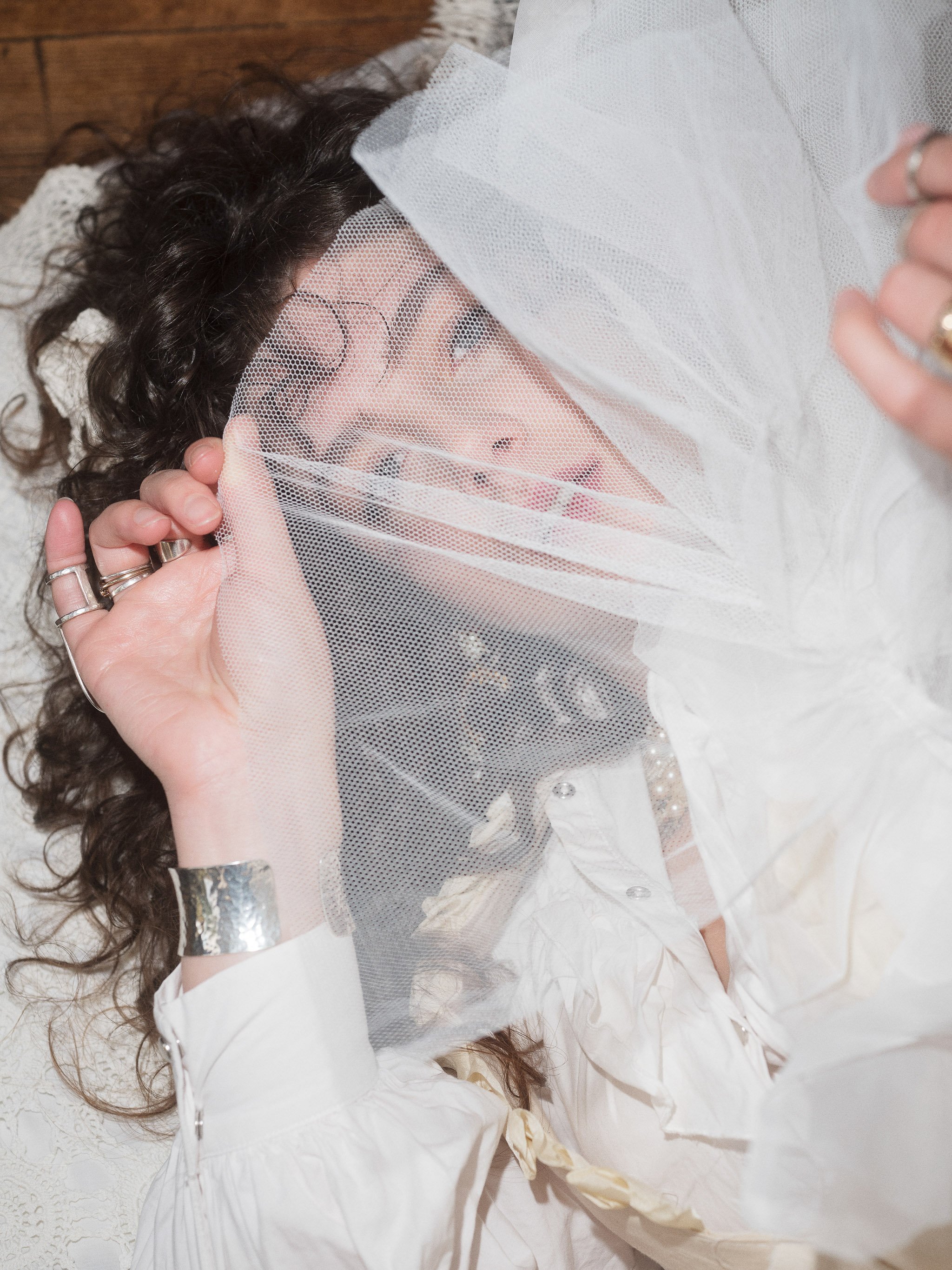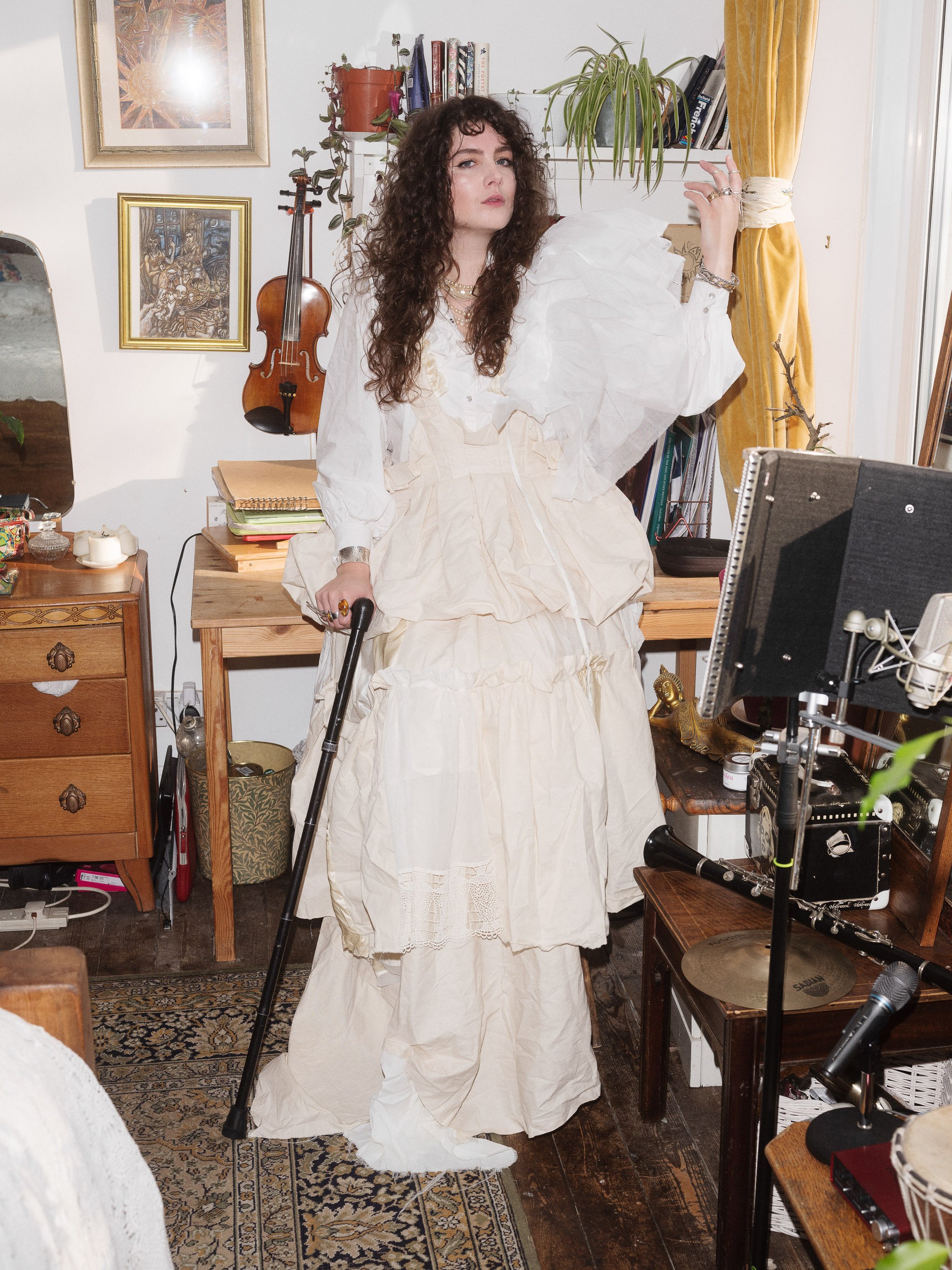Ruth Lyon
‘I’m trouble and I love it’
Interview by Alison Cowie
Photographs by Christopher Owens
From her bedroom in Heaton, singer, musician and disability activist Ruth Lyon talks about her new EP, the barriers she faces when performing, and why she’s not afraid to cause problems.
Ruth Lyon grew up in rural North Yorkshire and, like most kids of a similar upbringing, spent her days outdoors, climbing trees and exploring the rugged landscape.
She was also drawn to the power of music and spent hours listening to her dad’s record collection that combined Joni Mitchell, Bob Dylan and Yorkshire’s own Jake Thackray with an array of 70s disco classics.
Ruth showed a gift for playing music from a young age, too. She began violin lessons at five years old and taught herself piano a few years later.
As she neared her teenage years, the girl from Yearsley spent her weekends at Leeds College of Music, part of Yorkshire Young Musicians, where she dreamt of becoming a classical violinist.
Ruth had already started writing her own songs when she began experiencing ill health at 14.
At 15 years old, she was diagnosed with juvenile rheumatoid arthritis.
Ruth missed two-thirds of school from then onwards as doctors battled to keep her worsening symptoms at bay with cocktails of drugs and courses of chemotherapy.
In a cruel twist, the aggressive form of arthritis stopped the aspiring concert musician from playing her beloved violin, which she describes as being her “whole identity” up until that point.
Ruth spent long periods alone in her bedroom, where she used singing and songwriting as an outlet to process what was happening.
“I spent a lot of time in my own head as I couldn’t move around very much,“ Ruth says of that time.
“Music was one of the only things that I could do and, because I couldn’t play any instruments, I started singing.
“Having something to battle gives you a greater understanding of people and a deeper appreciation of things. I learned that from an early age.”
At 16, Ruth met her now husband, Conrad Bird, a keen musician who lived in the neighbouring village. The pair soon formed an unbreakable bond.
When Conrad went to study at Warwick, he and Ruth formed Holy Moly & The Crackers, a collective of folk-rockers who have gone on to release three studio albums (the fourth, Solid Gold, will be released on March 17), tour extensively across the UK and Europe, and attract a legion of dedicated fans with their fiery performances that blend folk, Americana, rock and indie.
“It was kind of a joke at the beginning – as you can probably tell by the name. We started off by playing in people’s kitchens. We were smashed most of the time and it was just about friendship and having the best time.
“But the band saved me in a way because it gave me an outlet to sing. It took two years to relearn how to use my hands but I eventually regained the strength in my fingers to pick up the fiddle and play a bit at a time.
“Being able to do that, in a non-pressure environment, with good people who were really encouraging, was something I needed at that point in my life.”
Ruth, who has always loved fashion and clothes, applied to study Fashion Design at Northumbria University, and when she moved to Tyneside to begin her course, Conrad and the band followed.
“It was when we moved to Newcastle that we realised we wanted to take the band a bit further and focus on it. We were touring every weekend and every holiday while I was studying.
“Two days after I graduated, we went on a five-week tour of Europe in our little van.”
While Ruth regained the ability to play her violin, she continued to suffer health issues and, after collapsing at a gig in London in her early twenties, became dependant on a wheelchair.
The experience of being a performer and a wheelchair user has been an ongoing challenge, with Ruth describing 90 per cent of the music venues she’s visited as being inaccessible.
“Most venues will say they're accessible but that’s only for the audience,” she explains. “They don't expect to have a disabled musician or performer.
“It’s tough for me but also the people around me because they've got to support me, carry me around, set up my gear, make sure I'm fed and that I'm not stuck or trapped somewhere.
“It’s frustrating and it makes me feel like an outsider in my own industry.”
“Music is a powerful way for people to express themselves but also to heal, learn and share.”
Ruth’s plight has led her to become a disability activist and she’s an ambassador for Attitude is Everything, a charity that works with disabled people, the music industry and live venues to improve access for audiences, staff and performers.
“Having more representation of disabled artists is very important to me and that’s why I love working with Attitude is Everything. It gives me an immense sense of power to be able to talk about some of the things I’ve experienced and have people listen, while shining a light on those who are being very inclusive.
She continues: “Loads of other diversity groups have great pushes and lots of media coverage, which is amazing, and that’s not to say that should change. But for me and a lot of people in my community, we feel like disability is left behind. That needs to change.
“A lot of people think that being “disability friendly’ is for the benefit of the person who's disabled, but it's a benefit for everybody.
“It's important that there's more space for us and more room for us to be part of things like the music industry.
“Music is a powerful way for people to express themselves but also to heal, learn and share.”
Despite their success, Ruth, Conrad and the Holy Molys have resisted the urge to move to London, recognising the benefits of remaining part of the close-knit Newcastle music scene.
“In the North East, there are so many people giving each other opportunities and sharing contacts,” Ruth enthuses. “A win for one feels like a win for all of us. That's something I really connect with. It’s better for everybody if we share in that.”
This camaraderie was shown when Ruth was asked to join a residency at Newcastle-based Blank Studios with fellow North East musician Nadine Shah. It was an experience that proved a catalyst for Ruth’s first solo work.
“I wanted to explore arrangements and instrumentation, but also find out if I was good at doing solo stuff, and if I liked it,” Ruth reflects.
“Nadine gave me loads of great advice and the confidence and belief to give solo work a go.”
A second residency shortly afterwards at Sage Gateshead, the first of its kind at the live music venue, provided Ruth with more focus and resources - including the chance to work with the composer and arranger Fiona Brice - to build on her solo work, which she describes as more “melancholic and introspective” compared to the band’s energetic style.
“The band is quite punky; it’s lots of fun and lots of shouting, whereas my solo work is the other side of me.
“I think there will always be a sense - whether it's obvious or not - of sadness in my music because I still feel the loss of the things I can't do.
“Being disabled is difficult. Needing to rely on other people for help is a drain. It can be a blessing but sometimes you don’t feel like a whole person.”


“Most venues will say they're accessible but that’s only for the audience. They don't expect to have a disabled musician or performer.”
The pandemic and resulting lockdowns gave Ruth - now a board member at Sage Gateshead - the time and space to work on her second EP.
She largely recorded Direct Debit to Vogue in bed due to her ongoing mobility issues, echoing the artist and muse, Frida Kahlo, who often painted in bed because of her own health complications - and whose biography sits on Ruth’s bedside table.
The EP was released in November 2022 and produced by Bristol-based John Parish who has previously worked with PJ Harvey, Aldous Harding and Tracy Chapman.
The name, Ruth reveals, is a nod to her conflicting emotions as her subscription to the iconic fashion magazine fell on her doormat each month.
“I love fashion but it can also make me feel really shit and really anxious,” the musician explains.
“I'd look at Vogue each month and be excited to know what was inside and if it’d give me some inspiration for a new style. But I’d also think, ‘I don't want to look at it because it's going to make me feel fat or ugly’.”
Direct Debit to Vogue comprises five folk/chamber pop tracks where Ruth’s haunting vocals explore themes of life, death, identity and difference.
Lyrics from standout track Flood, ‘I don’t want to be your inspiration porn that makes you feel warm like a nice cup of tea… I’d rather you found a kink that didn't involve me’,
starkly reflect some of the attitudes Ruth and those closest to her have experienced.
“Some people can be nasty,” the songwriter recalls. “One woman came up to me a few years ago and said people like me were a drain on the NHS and should have been drowned at birth’.
“But then my husband can have people being really patronising and saying ‘aww, well done,’ for being with me. Or someone will come up to me crying and say, ‘it must be so hard’, when I’m just in Asda buying some coffee.
“The intrusive nature of being different seems to invite weirdos who will come and give you unwanted advice and attention. The EP is about that, but there is a lot of beauty and power in being different or being imperfect, so it’s a celebration of that too.”
Despite the profoundly personal lyrics, Ruth is happy for listeners to draw their own conclusions from her songs.


“Any big change in history, the catalyst has been somebody causing havoc.”
“I tried to write the EP in a way that it would be relatable to anybody. You can listen to a song about my life and feel sad, but relate it to a different loss or a tricky situation, relationship, or whatever.”
In March 2022, Ruth was invited to SXSW festival in Texas, where she participated in a panel discussion with Australian singer Eliza Hull, who suffers from the neurological disorder, Charcot Marie Tooth, and American blind singer Lachi. She describes seeing her fellow panellists perform their music afterwards as “spiritual”.
Ruth explains: “When Lachi came on to the stage, she was audio describing herself and said: ‘I am a proud, black, blind woman with cornrows.’
“Hearing her talk about disability culture as something to be proud of was something I hadn't heard before. It was such a powerful statement and it affected me deeply.
“I cried so much I had to reapply my make-up three times before I took to the stage.”
The Yorkshire singer and musician - who is about to embark on a new tour with Holy Moly & The Crackers and is planning a solo tour while recording her debut album later this year – states on her music website: “I’m trouble and I love it.”
Asked what she means, Ruth provides a typically sage response.
“We are conditioned to go along with stuff and not cause a fuss because you don’t want to be seen as rude or a diva. But with any big change in history, the catalyst has been somebody causing havoc and fighting.
“It would be easy for me to sit by and say it’s ok that I have to be carried around or crawl to where I need to be, but I don’t want to accept that. I'm going to fight and shout, and shine a light on how shit it can be.
“I know I’m hard work because of the extra things that I need and the extra accommodations that people have to make. But that’s ok.
“I am trouble and I do love it. It’s not something to be ashamed of.”
Talking from her bed in the Heaton home she shares with her husband, dressed in a self made, ethereal-looking white dress, ‘trouble’ is not an adjective that readily springs to mind. But then, it’s outside this sanctuary that she faces her real challenges - be it people’s attitudes or the physical barriers to do her chosen vocation.
Ruth Lyon may be making impressive gains in a notoriously competitive industry – either as part of Holy Moly & The Crackers or her solo work – but with a heart of a lion, she’s ready to bare her teeth - and her soul - whenever she needs to, much to the benefits for the worlds of music and disability advocacy.
Learn more






